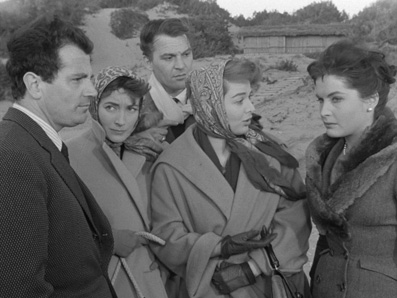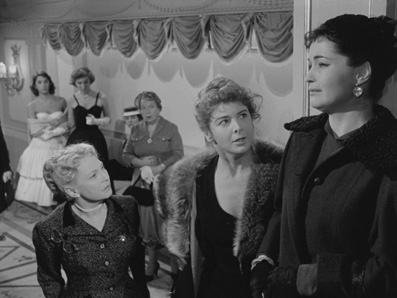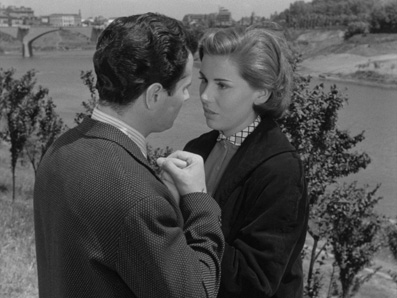| |
"I like the complexities of a group relationship, the mixing together of different personalities, the coming and going of people." |
| |
Director Michelangelo Antonioni on Le amiche |
| |
"I would only kill myself in a warm season. I don't want to be buried in the cold." |
| |
Momina de Stefani reflects on her friend Rosetta's suicide attempt |
There's probably a case for giving 'gathered friends' movies their own sub-genre. You know the sort of thing, a group of friends get together for a specified period – an evening, a weekend, a party, a wedding, a holiday, etc. – during which they talk, drink, eat and fool around. Then it all starts to come apart. Old resentments surface, arguments explode and embarrassing secrets are exposed to all, a favourite being that one of the group has slept with the partner of another. The storm usually passes and emotional wounds are bandaged to allow the individual parties to go their separate ways, their friendships damaged but still largely intact.
These films come in three distinct flavours, ones in which the group members are predominantly or exclusively male, predominently or exclusively female, or of roughly evenly mixed gender. At their best they make for enthralling viewing, experiments in social chemistry in which the varying personalities of the indivdual human components are used to expose anxieties, desires and disappointments that we theoretically all share. And if you don't then there's always the schadenfreude pleasure of watching people with whom you have nothing in common come apart at the seams. Of course, this will only take you so far – I've long ago passed the point where I couldn't care less for the emotional insecurities of shallow, middle-class Brits who are only able to be wallow in self-pity because they've got bugger all else to really worry about. Hence my weariness at Joanna Hogg's critically acclaimed contributions to the sub-genre, Unrelated and Archipelago, both of which are populated by people I wanted to hurt with extreme prejudice.

What tends to distinguish the best of these films – or at least the things we tend to remember them for – is the quality of the scripts and the conviction of the performances. One will inevitably feed the other, with a smart ensemble screenplay attracting a top flight cast, from which memorable characters will inevitably grow. This marriage of wordplay and performance has produced a number of genre luminaries, including Bruce Beresford's Don's Party, Jason Miller's That Championship Season, Peter Mullan's Orphans, John Sayles' The Return of the Secaucus Seven, Thomas Vinterberg's Festen, and that most iconic of examples, Mike Leigh's Abigail's Party. Feel free to disagree and compile your own list.
Le amiche [The Girlfriends] pre-dates every one of those titles by a good many years, being made in 1955 by a certain Michelangelo Antonioni, he of L'Aventura, Blow-Up and Zabriski Point. But then you didn't need me to tell you that. Unlike any of the above-mentioned films, the key characters here are predominantly women, a rarity even in modern western cinema. Boutique manager Clelia (Eleonora Rossi Drago) has just returned from Rome to her native Turin to oversee the opening of a new fashion salon, which is still in the final stages of being fitted out. It's her first night in the city, and chance sees her come to the aid of the unconscious Rosetta (Madeleine Fischer), a woman who has taken an overdose in the adjoining room. A short while later she meets Rosetta's friend Momina (Yvonne Furneaux) and soon finds herself part of a well-to-do social group that includes successful ceramic artist Nene (Valentina Cortese) and carefree socialite Mariella (Anna Maria Pancani). It turns out that Momina's current lover Cesare (Franco Fabrizi) is the architect in charge of the construction of Clelia's new salon, and Clelia is soon involved with his assistant Carlo. As the group meet and socialise, Momina and Clelia try to uncover the reasons for Rosetta's attempted suicide and discover that she is having an affair with Lorenzo (Gabriele Ferzetti), a talented painter and Nene's fiancé.
There are plenty of characters to keep tabs on here, but a solid cast makes it easy to differentiate and engage with them from an early stage. Whether you feel for them and their problems, many of which have since become sub-genre staples, is a different matter. Certainly by the end of the film's caption-announced first half I was engaged rather than emotionally involved. All of which changes in the second half, where the fragility of the bonds that bind the group is gradually exposed and the relationship between Rosetta and Lorenzo, which in the first half has the entrancing appeal of an illicit affair, is brought down to earth to explore the damaging consequences for everyone involved. And even the lighter early scenes take on a different tone when viewed for a second time, where elements that previously seemed frivolous or incidental are given considerably more weight by the knowledge of what subsequently occurs.

In many ways Le amiche is one of Antonioni's most accessible films, its multiple lead characters and encounter-driven narrative having proved influential enough to become conventions in themselves (it's no real surprise that Antonioni's favourite American director was Robert Altman). The emphasis on dialogue may seem atypical of the director, given the purposeful use of silence in his subsequent films, but many of the themes he would later develop are recognisable here, as is his developing interest in long takes and drifting camera moves, a stylistic choice so wedded to the drama that it has largely escaped analytical study. And given the deliberate pacing of his later work, Le amiche moves at quite a lick and is deftly economic in its storytelling and character detail – that Clelia has just arrived in Turin is announced by something as simple as unpacking a toothbrush while still dressed in her street clothes, while her brief conversation with Carlo at the estate of her childhood provides a moment of telling social bonding and gives credence to Clelia's claim that she feels she has always known him.
If there's a difficulty for a non-Italian speaking audience it lies in the quantity and pace of the dialogue, which will have all but the fastest readers glued to the subtitles (I needed a second viewing to properly appreciate the filmmaking and performances). Yet while the characters frequently converse in Le amiche, they ultimately fail to communicate with each other on a meaningful level. This manifests itself in a number of ways: in Lorenzo's inability to express his true emotions to Rosetta or talk to Nene about the affair, despite repeated promises to Rosetta that he would; in the failure of Rosetta's friends to fully comprehend the level of her emotional involvement with Lorenzo or the consequences of his possible rejection; in Nene's decision not to tell her fiancé of her invitation to exhibit in New York; in the salon owner's realisation that despite having worked with Clelia for many years, she doesn't really know her at all. In spite of their relationships and the supposed friendships, almost everyone here is living an isolated existence, one ruled by a disparity between what they profess to desire, what they actually want, and what they are ever likely to have. They fall in an out of love, but it's rarely enough – as Nene tells Rosetta as she prepares to stand aside to allow the latter's affair with Lorenzo to take its course: "Two lonely people, whether they're married or not, can't stay together for love."
The transfer here was created from the original camera negative, which was photochemically preserved and digitally restored to clean up elements such as vertical lines, scratches, excessive grain, instability and flickering. Missing frames were digitally completed from a combined dupe negative from a French edition. The results are, for a monochrome film made in 1955, really rather lovely. Just about everything is spot on here, with a rock solid, deliciously detailed picture that boasts a sometimes luxurious tonal range. The image can seem a little bright at times, but this does ensure that detail is preserved right across the range without sacrificing the black levels, which are well balanced even in the brightest scenes – in the dominant white of the hospital, the blacks are still solid on Momina's coat. The damage repair is occasionally visible, particularly in darker night exteriors, and the black levels do occasionally slip a bit here, but for the most part this is how you wish every European film from the period could look on home video.

Both the Blu-ray and DVD versions are included in this dual format release – both are impressive, but sit the two side by side and there's a clear and unsurprising winner. The picture has consistently more detail on the Blu-ray transfer, something visible in just about every shot, whether it be the texture of surfaces (wood, stone, skin, clothing, etc.), the legibility of street signs, or the patterns on walls and furniture. The exterior scenes in particular have a richness to them that Blu-ray just seems to bring out on older monochrome films.
As with so much of Italian cinema of the time, the dialogue here has been post-dubbed, which does provide the occasional mismatch of voice to mouth movements and acoustics that do not always suit the location. But this is par for the course, and in other respects both the Dolby 2.0 mono on the DVD and the DTS-HD Master Audio 2.0 mono on the Blu-ray are clear and free of obvious damage. The expected restrictions in dynamic range are present, as is a slight treble bias to the dialogue, which can occasionally vary a little in volume.
Gabe Klinger Introduction (8:24)
Chicago-based film writer Gabe Klinger provides an engagingly informed and spoiler-free introduction to the film and its director, one that (unlike some other so-called introductions) is safe to watch before the film itself.
Antonioni in the Industry (10:35)
Once again we're in the company of the knowledgeable Mr. Klinger, who contextualises Antonioni in relation to the Italian film industry of the period, with frequent prompting from his typed notes. It's an informative ten minutes, and Klinger nails one of the things that separates early films like Le amiche from Antonioni's later work when he recalls creating an Antonioni clip compilation and his struggle to select standout scenes in films that need to be seen in their entirety to fully appreciate.
Booklet
A fine 28-page booklet whose contents include a translation of a 1957 Cahiers du cinema article on the film and the adaptation of Cesare Pavese's novel, a 1956 letter written by Antonioni to Italo Calvino in which he talks about the film ("If I could," he writes tellingly, "I would redirect at least a third of Le amiche"), extracts from a 1978 interview with the director, detailed notes on the restoration, credits for the film and production stills. As ever with MoC, an essential companion to the film.
Not, perhaps, as challenging or artistically adventurous as many of Antonioni's subsequent films, Le amiche is still an enthralling and subtly sophisticated work, one whose energy and tone may well surprise those who know the director primarily for his later explorations of alienation and relationship breakdown. That, together with the fine transfer and some useful supplements, make this Masters of Cinema release worthy of enthusiastic recommendation.
|